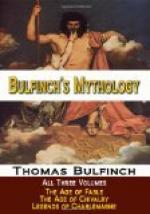The Abbot of Cluny, indignant at the false accusation of Amaury, advanced, and said, “By Saint Benedict, sire, the traitor lies in his throat. If my nephew has slain Charlot it was in his own defence, and after having seen his brother wounded by him, and also in ignorance that his adversary was the prince. Though I am a son of the Church,” added the good Abbot, “I forget not that I am a knight by birth. I offer to prove with my body the lie upon Amaury, if he dares sustain it, and I shall feel that I am doing a better work to punish a disloyal traitor, than to sing lauds and matins.”
Huon to this time had kept silent, amazed at the black calumny of Amaury; but now he stepped forth, and, addressing Amaury, said: “Traitor! darest thou maintain in arms the lie thou hast uttered?” Amaury, a knight of great prowess, despising the youth and slight figure of Huon, hesitated not to offer his glove, which Huon seized; then, turning again to the peers, he said: “I pray you let the combat be allowed me, for never was there a more legitimate cause.” The Duke Namo and the rest, deciding that the question should be remitted to the judgment of Heaven, the combat was ordained, to which Charlemagne unwillingly consented. The young Duke was restored to the charge of Duke Namo, who the next morning invested him with the honors of knighthood, and gave him armor of proof, with a white shield. The Abbot of Cluny, delighted to find in his nephew sentiments worthy of his birth, embraced him, gave him his blessing, and hastened to the church of St. Germains to pray for him, while the officers of the king prepared the lists for the combat.
The battle was long and obstinate. The address and agility of Huon enabled him to avoid the terrible blows which the ferocious Amaury aimed at him. But Huon had more than once drawn blood from his antagonist. The effect began to be perceived in the failing strength of the traitor; at last he threw himself from his horse, and kneeling, begged for mercy. “Spare me,” he said, “and I will confess all. Aid me to rise, and lead me to Charlemagne.” The brave and loyal Huon, at these words, put his sword under his left arm, and stretched out his right to raise the prostrate man, who seized the opportunity to give him a thrust in the side. The hauberk of Huon resisted the blow, and he was wounded but slightly. Transported with rage at this act of baseness, he forgot how necessary for his complete acquittal the confession of Amaury was, and without delay dealt him the fatal blow.




